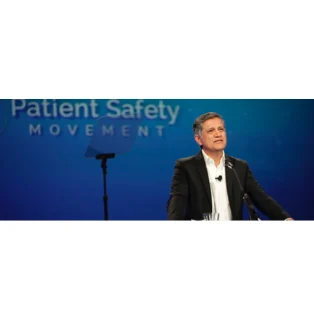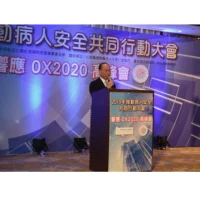New Actionable Patient Safety Solution #17: Patient Safety Curriculum for Schools
The Patient Safety Movement Foundation (PSMF) announced today at the 7th Annual Patient Safety, Science & Technology Summit that 90,146 lives were saved in 2018, thanks to the efforts of more than 4,710 hospitals committing to patient safety, and 89 healthcare technology companies that have signed the open data pledge. A total of 273,077 lives have been saved since the anniversary of the first summit in 2013.
During his state of the movement address on the first day of the Summit, the Founder & Chairman of the Patient Safety Movement, Joe Kiani, reviewed the progress made to date, reminded attendees of the 2020 goal and urged every hospital to implement all of the Actionable Patient Safety Solutions (APSS). He stated, “To err is human but to not put the proper patient safety processes in place is inhumane.”
Leadership Announcements: Kiani also announced that David B. Mayer, MD, will serve as the Chief Executive Officer effective immediately, and that Michael A. E. Ramsay, MD, FRCA, was named Chairman of the Board effective after the 2020 Summit. Dr. Mayer was one of the architects of CANDOR, which focuses on transparency, immediate root cause analysis and education and when implemented at Medstar has reduced serious patient safety events by 65% and reduced the cost of care associated with serious safety events (including medical liability) by more than $70 million since 2012. Dr. Mayer also serves as the Executive Director of MedStar Institute for Quality and Safety and previously served for almost seven years as MedStar Health’s Vice-President for Quality and Safety. He was selected by the International Society for Quality in Healthcare (ISQua) as an International Quality and Safety Expert and has been presented with the 2013 Founders’ Award from the American College of Medical Quality and in 2016, the Patient Safety Movement Foundation’s Humanitarian Award.
Dr. Ramsay is the Chairman of the Department of Anesthesiology and Pain Management at Baylor University Medical Center and President of Baylor Scott & White Research Institute. Dr. Ramsay is also a Professor at Texas A&M Health Science Center and holds a clinical professorship in anesthesiology at the University of Texas Southwestern Medical School as well as in the Department of Periodontics at Baylor College of Dentistry, Texas A&M University. Dr. Ramsay is the developer of the Ramsay Sedation Scale, a measurement designed for interpreting the depth of sedation for patients in the critical care unit. This scale has been adopted around the world. He has published over 200 peer-reviewed articles and numerous chapters in textbooks. He was a member of the Sedation Analgesia Guidelines Task Force of the Society of Critical Care Medicine. Dr. Ramsay was the 2013 recipient of the Patient Safety Movement Foundation’s Humanitarian Award.
Summit Presentations: During today’s proceedings, world-renowned patient safety expert Dr. Peter Pronovost provided a keynote on going from healing in the hospital to being healthy at home. Dr. Kai Zacharowski, Director of the Department of Anesthesia, Intensive Care Medicine & Pain Therapy, University Hospital Frankfurt, and incoming President European Society of Anaesthesiology (ESA), shared his perspective from the ESA, urging critical care medicine intensivists and anesthesiologists to join forces to combat patient safety problems.
Actionable Patient Safety Solution #17: Patient Safety Curriculum for Schools
Dr. Steven Scheinman, Dean of Geisinger Commonwealth School of Medicine, introduced the 17th Actionable Patient Safety Solutions (APSS) on Patient Safety Curriculum for Schools. A core patient safety curriculum that can be adopted by educational programs for all healthcare professions (nursing, pharmacy, behavioral health, medicine, etc.) was released after nearly 2 years of development by a workgroup comprised of academics, clinicians and patient advocates dedicated to improving patient safety through educating the young. The curriculum will go beyond care of individual patients to address systems of care and close a critical gap in student training when they are introduced to patient safety.
Panel discussions included:
- Hospital Leadership Panel: Transparency from the Legal Perspective. The panel of experts was joined by patient advocate Jack Gentry. The panel encouraged transparency, just resolution, and immediate root cause analysis after each event.
- Media Panel: Journalists from USA Today, Health Service Journal, The International Consortium of Investigative Journalists, and CALMatters. They were joined by Jim Messina and patient advocate Jamie Thomas King. Jamie shared the heartbreaking story of losing his youngest son, Benjamin, in 2016 and being propelled into the world of patient safety. The panel urged hospitals to be open and share their stories of medical errors and medical successes.
The first day’s program ended with recognition of those who have made the greatest contributions in 2018 toward achieving the PSMF’s goal of zero preventable patient deaths by 2020. This year’s Humanitarian Awards recognized the lifesaving achievements of the following leaders in patient safety:
- Steven Moreau Humanitarian Award Winner: Each year we present the Steven Moreau Humanitarian Award to a hospital administrator whose zeal for improving patient safety in their hospital is clearly prominent. This year the award was presented to William C. Wilson, MD, MA, Chief Medical Officer, UCI Health. Under Dr. Wilson’s leadership, UCI Health in Orange, California, became the first academic medical center to obtain a 5-Star ranking under the Patient Safety Movement Foundation’s 5-Star Hospital Ranking Program in November 2018.
In 2018, their commitments saved 16 lives. Dr. Wilson has worked to fully engage UCI Health’s clinical staff in creating a culture of safety for their patients and families.
- Beau Biden Humanitarian Award Winner: This award is normally presented to a government official who has improved patient safety, but this year it went to Julie Morath, RN, MS, President & CEO, Hospital Quality Institute (HQI). She has helped spread transparency across the entire state of California and created a model for other states to follow. Under Morath’s leadership, HQI and CHA encourage voluntary reporting on five hospital-acquired conditions: CLABSI, SSIs, sepsis, VTE, and maternal safety. In a year’s time, she was able to get 92% of California hospitals engaged, and 55% of them are publicly displaying this dashboard on their websites.
- PSMF Humanitarian Award Winner: Tore Laerdal, MSc, Chairman and CEO of Laerdal Medical, Executive Chairman of Laerdal Global Health, and Executive Director of Laerdal Foundation, was awarded our PSMF Humanitarian Award. Under Tore’s leadership, Laerdal Global joined the Patient Safety Movement Foundation’s network in 2017. Every year since, Tore has shared Laerdal Global’s progress implementing simulation-based training to advance patient safety across 80+ countries. Laerdal Global has partnered with other organizations, such as the American Heart Association, American Academy of Pediatrics, U.S. National League of Nursing and British Heart Foundation, to work on solutions to address neonatal safety, airway safety, optimal resuscitation, maternal care and feeding tube placement. In 2018 alone, Laerdal Global partnerships saved 30,500 lives.
Latest Articles
Patient Safety Movement, Actionable Patient Safety Solution, Patient Safety Curriculum for Schools
Patient Safety Movement Announces 273,077 Lives Saved


![Tuberculosis Diagnostics: The Promise of [18F]FDT PET Imaging Tuberculosis Diagnostics: The Promise of [18F]FDT PET Imaging](https://res.cloudinary.com/healthmanagement-org/image/upload/c_thumb,f_auto,fl_lossy,h_184,q_90,w_500/v1721132076/cw/00127782_cw_image_wi_88cc5f34b1423cec414436d2748b40ce.webp)





